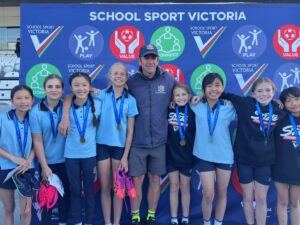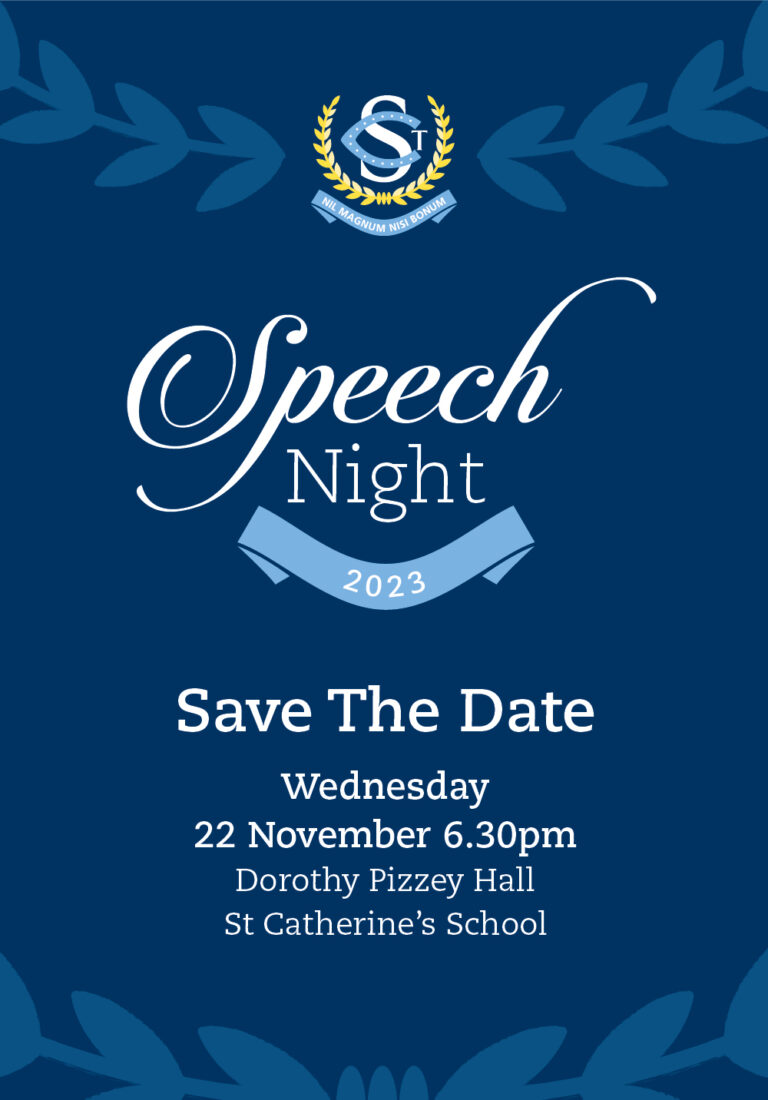From the Principal
Sporting Tribute – Mr Tom Crebbin
The success of our Barbreck athletes at the State Athletics Championships this week, together with christening one of our two new Single Sculls rowing boats has made this week quite memorable for our retiring Junior School Sport Coordinator, Mr Tom Crebbin.
At the State Championships this week, both the 10-Years and 11-Years 4x 100m Relay Teams won Gold Medals. Year 6 student Imogen Brownjohn also won Gold in the 11-Years Long Jump with an incredible 4.62m jump.
Congratulations to the following athletes:
- 11 Years Relay Team: Sienna Yu, Allegra Gavilan-Bongiorno, Taylor Lee and Imogen Brownjohn
- 10 Years Relay Team: Missoni (Missy) Byrne, Abigail Chan, Lola Parker and Sienna Xu
- Imogen Brownjohn, 11 Years State Champion Long Jump
The girls have been training fast and accurate baton changes for their relay under the watchful eye of Mr Crebbin and succeeded with an electrifying win in both races.
On Sunday afternoon, at the launch of the Rowing Season, Mr Crebbin’s 16-year contribution to St Catherine’s Sport was recognised with the naming of one of the new boats, through funds raised by The Heyington Club.
Whilst outstanding results like our recent Barbreck athletes’ success are always valued, Mr Crebbin’s greatest contribution to St Catherine’s School has been his infectious love of sports across many disciplines. His enthusiasm has been engendered in so many St Catherine’s girls through his efforts. There are many stories parents tell of Tom persuading their daughter to give a particular sport a try, with that girl continuing with her love of sport throughout the rest of her School career, thanks to the expert eye and motivating spirit of Tom.
Most notably, Tom introduced the highly successful Junior Joggers Program to Barbreck, through which many of our junior students were introduced to early morning exercise as a fun activity. We all know the value of having learned the discipline of sport and training as we enter life as an adult. Mr Crebbin’s contribution to the lives of many St Catherine’s girls in building this love of sport, and discipline to succeed, cannot be underestimated. Please join with the Rowing community this week and congratulate Tom if you see him at School.
Top Study Tips
With the heavy study and examination period commencing this week for our Years 9 to 11 students, in addition to the ongoing VCE exams for our Senior classes, I thought it timely to remind our families of some useful study tips.
The below list of study tips is provided by Melbourne Psychologist, Andrew Fuller. I encourage parents to continue conversations with their daughters about how they are approaching their studies and to utilise Andrew’s tips as your reference.
- Study in silence
This is the single most powerful way to increase your marks. No texting, music, or computer screens. Outcomes improve when you practise in the same conditions you want to perform in. In the exam room there will not be music, mobile phones or computer screens.
- Organise & transform the information you want to learn
Just reading your notes repeatedly does not work. Your memory stores information best when you organise or transform it. This means organising your notes so that the main idea is highlighted on each page. Then take your notes and turn them into a flow chart or a mind map, or see if you can fit them to a song you know well or make it into a sound recording. The more times you can transform and re-organise the information the more firmly it is remembered.
- Put off pleasurable activities until work is done
This is a painful one but if you play computer games before you get down to studying, the levels of dopamine in your brain lessen and you will lose the drive and motivation you need to study effectively. Work first, play later.
- Talk yourself through the steps involved
One of the things that highly successful students do is to explain out loud to themselves the steps involved in completing a task. This applies to every subject area. By saying out loud, “First I have to do… Then I have to do…” and so on, any part that you are uncertain about becomes clear and you can then use this to guide where you need to do more.
- Ask for help
Teachers want their students to be interested and to do well. You will be amazed if you ask a question how many other people do not understand it either. If you are really scared about asking questions in class, have a private talk to your teacher about this.
- Write & re-write key points
Writing the main points of the area you are learning helps you to remember them. If you can add in re-organising and transforming them into different formats (drawings, flow chats, podcasts etc.) that makes it even more powerful.
- Make lists & set priorities
Make a ‘to-do’ list each week. Write down in your diary the most important things to be done in each subject, each week. High-scoring students do a little bit on each subject a lot, rather than doing a lot of work on one subject every so often. If you are doing subjects that involve presenting a folio or preparing a presentation, it is still important to do work on the other subject areas.
- Keep a record of how much study you have done
It increases motivation when we can tick things off lists and when we can see how much we have done.
- Test yourself
Your memory and understanding are strengthened when you create tests for yourself. Give yourself a test each week for the rest of the year so you can focus more time on learning the parts you do not fully understand or recall. Your practice tests should replicate the exam in length, environment, and format. For example, if you must write a 250-word response, practise this in a timed trial.
- Set study times
Decide when you are most alert and set aside time then to study. If you wait until you are in the right mood before beginning to study, you may wait forever. There are no exams scheduled at 9.00pm at night, so do not study at that time. Be mindful of your body clock and maintain a school routine.
- Exercise
Memories seem to be strengthened when you do some exercise about four hours after a study session. Exercise also lowers your stress levels.
- Lower your stress levels
The biggest barrier to getting good marks is not your brain; it is your stress levels.
VCE Study Days – Saturday
Our VCE students have appreciated the opportunity to complete supervised ‘timed tasks/exams’ in the Nicholas Library every Saturday 9.00am to 1.00pm. As the girls have been made aware, completing practice exams is an important part of their preparation for VCE exams.
I have been so impressed with the attendance every Saturday with approximately 40 girls arriving to complete practice papers or revision at 9.00am. Specifically, the girls build confidence to:
- Sit in an exam environment and sustain effort for a long period of time.
- Manage one’s time effectively during the exam to ensure all questions are answered in a timely manner.
- Write with pen on paper, without hand fatigue.
- Learn to be relaxed and confident in an exam environment.
- Develop an increased resilience to cope with the demands of exams.
2023 Speech Night




